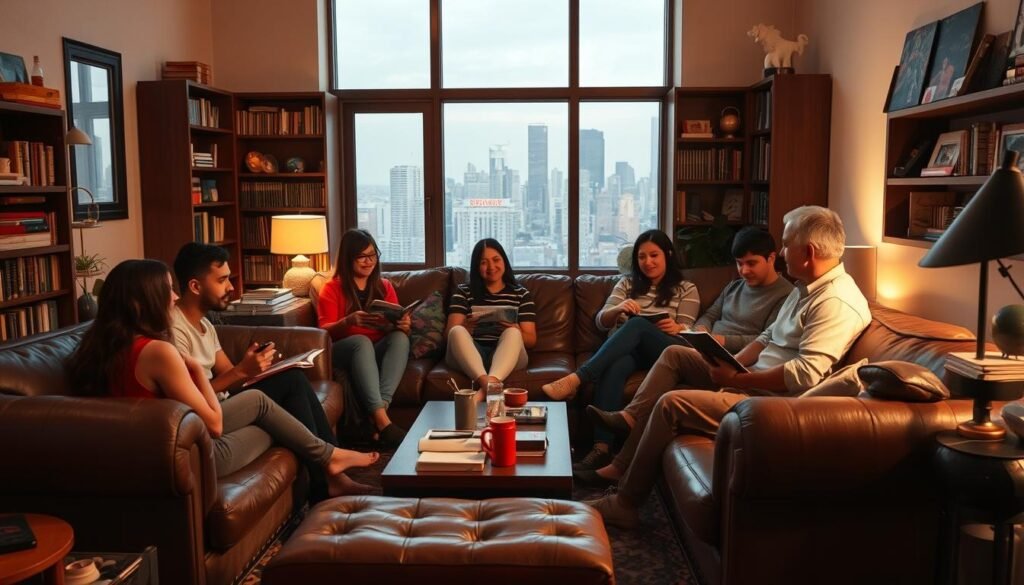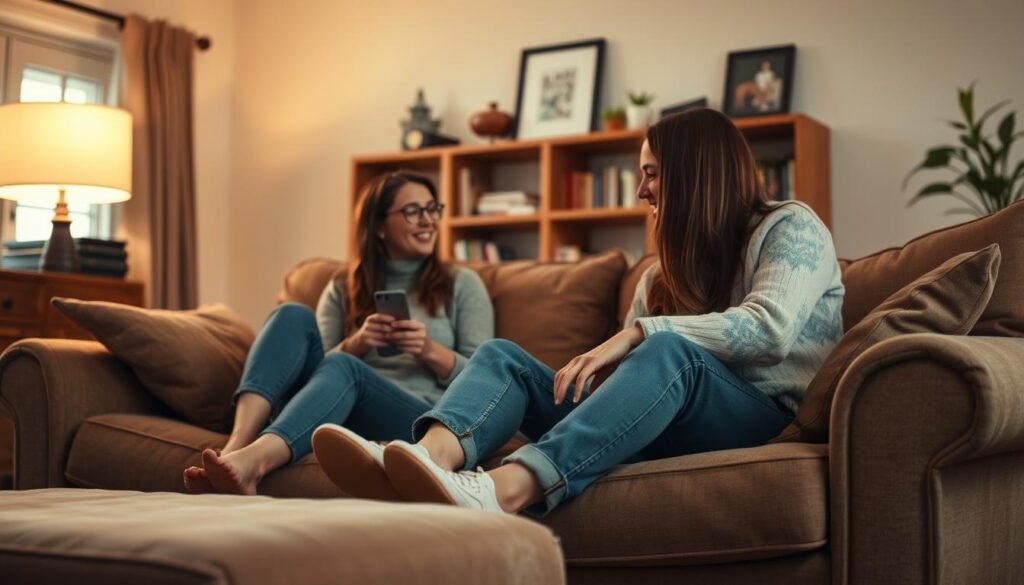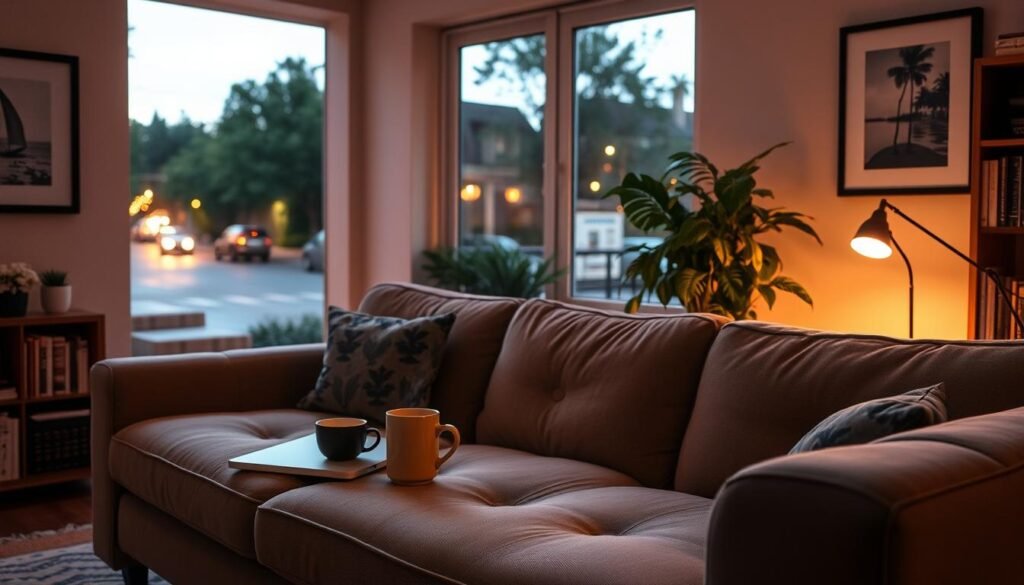Welcome to the ultimate guide for Couchsurfing safely. It’s all about exploring new places and meeting travelers. But, always remember, your safety comes first.
Safe Couchsurfing practices are key for a great time. Make your profile trustworthy, know about cultural differences, and learn Couchsurfing basics. This way, you can enjoy your travels without worries.
This guide is for both new and experienced Couchsurfers. It’s packed with tips to help you have a fantastic time. With the right steps, Couchsurfing can be incredibly rewarding.
Key Takeaways
- Understand the importance of creating a trustworthy Couchsurfing profile.
- Learn how to navigate cultural differences while Couchsurfing.
- Discover safe practices for hosting and being hosted.
- Find out how to minimize risks and stay safe while Couchsurfing.
- Explore the benefits of Couchsurfing and how to maximize your experience.
What is Couchsurfing and Why It’s Popular
Couchsurfing is more than a platform; it’s a way to experience cultures authentically. It connects travelers with locals worldwide, building a community of respect and understanding.

The Concept and Philosophy Behind Couchsurfing
Couchsurfing is all about sharing and hospitality. It’s about making real connections between travelers and hosts. This platform lets people dive into cultures, going beyond tourist spots.
The idea behind Couchsurfing is cultural exchange and personal growth. It’s not just about a place to stay. It’s about joining the local community, learning customs, and sharing your culture.
Benefits Beyond Free Accommodation
The benefits of couchsurfing go beyond free lodging. For couchsurfing for beginners, it’s a chance to dive into local cultures. Key benefits include:
- Forming lasting connections with people from different backgrounds
- Learning about local customs and ways of life
- Having a more authentic travel experience
- Improving skills like communication and adaptability
Through Couchsurfing experiences, travelers can see new places with a local’s view. This makes the journey more meaningful and unforgettable.
Creating a Trustworthy Couchsurfing Profile
Creating a trustworthy profile on Couchsurfing is key for a safe and fun experience. Your profile shows who you are and what you believe in. It’s important to show yourself in the best way possible.
Profile Elements That Build Trust
A trustworthy profile has a few important parts. These are:
- A clear and recent profile picture
- A detailed and honest bio
- Verified references from previous hosts or guests

The Importance of Verification and References
Verification and references are crucial for trust in Couchsurfing. Verifying your profile proves who you are. References from previous interactions show how reliable you are.
To verify your profile, you can link your social media or other ID methods. References come from hosting or staying with someone, who speaks well of you.
Profile Photos: What to Share and What to Avoid
Your profile photos let others see your personality and interests. It’s important to share:
- Recent and real photos
- Photos that show your hobbies or interests
- Pictures with others to show you’re social
Don’t share photos that are too personal, not right, or misleading. They might scare off hosts or guests.
Researching and Vetting Potential Hosts or Guests
Before you open your home or accept a hosting invitation, it’s key to know how to check your Couchsurfing friends. Looking into potential hosts or guests is a big step. It makes sure everyone has a good time.
Checking a host or guest’s Couchsurfing profile and reviews is a smart move. Reviews show how someone hosts or surfs. They help you decide if it’s a good match.
Reading Between the Lines of Reviews
Reviews aren’t just about the good comments. It’s about the details that tell you more. Look for specific stories of interactions. They show a person’s kindness, trustworthiness, and how they talk to others.
Notice how someone reacts to all kinds of reviews. This shows their professionalism and how they handle feedback.

Red Flags to Watch For
When you’re researching, watch out for certain warning signs. Look for profiles that seem incomplete or odd. Also, be wary of profiles with no verifications or lots of negative reviews about dishonesty or disrespect.
Trust Your Instincts: When to Decline
Even with good research, trust your gut. If something doesn’t feel right, it’s okay to say no. Your safety and happiness are most important.
By being careful and doing your homework, you can make your Couchsurfing adventures better. You’ll have a fun and safe time.
The Ultimate Guide to Couchsurfing Safely: Communication Protocols
Couchsurfing safely starts with good communication. When hosts and guests talk well, everyone has a great time. They discuss what to expect and what’s okay before they meet.
Establishing Clear Expectations Before Arrival
It’s key to talk about what’s expected before you get there. You should discuss house rules, when you’ll arrive, and other important stuff. This way, everyone knows what to do and when, making things smooth.
- Discuss house rules and boundaries.
- Agree on arrival and departure times.
- Share contact information for emergency purposes.
Pre-arrival Communication Best Practices
Good communication before you arrive is crucial. Use Couchsurfing’s messaging or other safe ways to talk. Be open about your plans and any worries you have.
Best practices include:
- Confirming the host’s or surfer’s identity.
- Discussing and agreeing on the terms of the stay.
- Sharing relevant information about yourself and your plans.
Sharing Itinerary Details with Trusted Contacts
Also, tell your friends back home where you’ll be. This way, someone knows where you are and can help if needed. Tell them your host’s info and when you’ll be there and when you’ll leave.

By sticking to these communication tips, Couchsurfers can make their stay safer and better. Talking clearly and kindly is the key to a good Couchsurfing experience.
Safety Tips for Couchsurfing Hosts
Creating a safe and enjoyable experience for Couchsurfing guests is key. You need to plan carefully, communicate clearly, and have safety protocols in place. As a host, you’re not just offering a place to stay. You’re also making sure your guests feel welcome and safe in your home.
Preparing Your Space for Guests
To host safely, prepare your space with your guests’ safety in mind. Make sure your home is clean and free of hazards. Provide clear instructions on how to use appliances and facilities. Also, ensure that emergency exits are accessible. Conduct a safety audit of your home to find any potential risks.
- Check for and mitigate any potential hazards such as loose wires or slippery floors.
- Provide a clear guide on how to use your WiFi and any other amenities.
- Ensure that your guests know the location of emergency exits and first aid kits.
Setting Boundaries and House Rules
Setting clear boundaries and house rules is crucial for a safe and harmonious hosting experience. Communicate your expectations about noise levels, guest responsibilities, and shared spaces. Discuss these rules with your guests before they arrive to avoid misunderstandings.
Having a mutual understanding of the house rules can greatly improve the hosting experience. It’s also wise to have a written copy of these rules available for your guests.
| House Rule | Description | Benefit |
|---|---|---|
| Noise Levels | Specify quiet hours to ensure restful sleep for both hosts and guests. | Promotes a peaceful environment. |
| Shared Spaces | Define how to respectfully share common areas like kitchens and living rooms. | Encourages harmony between hosts and guests. |
| Guest Responsibilities | Outline expectations for guests to clean up after themselves and respect the home. | Fosters a sense of responsibility and respect. |
Emergency Protocols for Hosts
Having emergency protocols in place is vital for hosting safely. Know basic first aid, have a list of emergency contact numbers, and be ready for unexpected situations. It’s also good to inform your guests about your emergency plan.
Emergency Preparedness Tips:
- Keep a list of emergency contact numbers handy, including local authorities and your country’s embassy if applicable.
- Ensure that you and your guests know the location of emergency services like hospitals and police stations.
- Have a basic first aid kit on hand and know how to use the items in it.

By following these safety tips, you can create a welcoming and secure environment for your Couchsurfing guests. This ensures a positive experience for both you and your visitors.
Safety Tips for Couchsurfing Surfers
When you start Couchsurfing, knowing how to stay safe is crucial. Safety should always be your top priority when you meet new people and stay in places you don’t know. Being ready and knowing what to expect can make your Couchsurfing safer.

Packing Essentials for Safety
Carrying the right items can help keep you safe while Couchsurfing. You’ll need a personal alarm, a portable charger for your phone, and copies of important documents like your ID and travel insurance. It’s also wise to keep a small first-aid kit handy. These items can help you stay safe and prepared for any situation.
- A personal alarm for emergency situations
- A portable charger to keep your phone charged
- Copies of important documents (ID, travel insurance, etc.)
- A small first-aid kit
Arrival Strategies and First Impressions
Making a good first impression and being strategic about your arrival can set the tone for a safe and enjoyable stay. Communicate clearly with your host before arrival to establish expectations and discuss any concerns. Upon arrival, be respectful of your host’s space and rules, and don’t hesitate to ask questions or clarify any doubts.
“The way you arrive and interact with your host can significantly impact your Couchsurfing experience. Be open, respectful, and clear in your communication.”
Having a Backup Plan and Emergency Fund
Even with the best planning, unexpected situations can happen. Having a backup plan and an emergency fund can provide peace of mind and a safety net. Research nearby accommodations, keep a list of emergency contacts, and have some money set aside for unexpected expenses. This preparation can be a lifesaver if things don’t go as planned.
| Backup Plan Elements | Description |
|---|---|
| Research Nearby Accommodations | Identify hotels, hostels, or Airbnb options near your location |
| Emergency Contacts | Save important phone numbers, such as your country’s embassy and local emergency services |
| Emergency Fund | Keep some cash aside for unexpected expenses or emergencies |
By following these safety tips, Couchsurfing surfers can minimize risks and maximize their experience, ensuring a safe and enjoyable journey.
Technology Tools for Safer Couchsurfing
Technology has made Couchsurfing safer. Now, there are many tools to help hosts and surfers stay safe. These tools make Couchsurfing more fun and secure.
Safety Apps Every Couchsurfer Should Have
Safety apps are key for Couchsurfers. Apps like bSafe and Life360 let you share your location. This way, friends and family can always find you. TripIt helps organize your trip, making sure you know your plans.

Location Sharing with Friends and Family
Sharing your location with loved ones is a smart move. Apps that share your location in real-time let them keep an eye on you. If something goes wrong, they can act fast.
Digital Security While Using Public WiFi
Using public WiFi? Keep your digital security in mind. A VPN encrypts your internet, keeping your data safe from hackers. Also, be careful about what you do online on public networks to stay safe.
Legal and Insurance Considerations for US Couchsurfers
It’s important for US Couchsurfers to know the legal and insurance basics. This ensures a safe and fun experience. As Couchsurfing grows, hosts and guests need to understand their rights and insurance choices.
Understanding Liability as a Host
Hosting a guest means more than just a place to stay. You might face legal issues if someone gets hurt. Homeowner’s insurance might not cover guests, even if they’re Couchsurfing.
Some hosts have found their insurance doesn’t cover Couchsurfing incidents. This is because it’s seen as a business activity.
To lower this risk, hosts can:
- Check their homeowner’s insurance to see what’s covered.
- Look for extra liability insurance for short-term guests.
- Make their home safer to prevent accidents.

Travel Insurance Options for Surfers
Travel insurance is crucial for surfers. It covers many situations, like trip cancellations and medical emergencies. When picking a policy, look for:
- Coverage for Couchsurfing activities.
- Medical evacuation insurance.
- Providers familiar with alternative accommodations.
Surfers should also read their policy’s fine print. This ensures they know what’s included and what’s not. This can avoid surprises during their travels.
Knowing about legal and insurance matters helps both hosts and guests. It makes Couchsurfing safer and more enjoyable for everyone.
Navigating Cultural Differences and Etiquette
Traveling and Couchsurfing can be amazing, but knowing local customs is key. Cultural differences can sometimes cause confusion. But, with a bit of preparation, you can easily navigate these differences.

Researching Local Customs Before Your Trip
Before you go, research the local customs and cultural norms. Learn about dress codes, mealtime etiquette, and social behaviors. For instance, in some places, you must remove your shoes before entering a home. In others, using your left hand for eating is seen as rude.
Gift-Giving and Contribution Expectations
Gift-giving is a big part of Couchsurfing etiquette. Bring a small gift that shows your culture or hometown. It could be a local specialty, a handmade craft, or a book about your area. Also, talk to your host about what you can do to help, like doing chores or cooking.
Respecting Personal Space and Boundaries
It’s important to respect your host’s or guest’s personal space and boundaries. Be careful about physical contact, sharing personal stories, or inviting others over. Talking openly about these boundaries can avoid misunderstandings and make your stay comfortable for everyone.
By understanding and respecting these cultural differences, you can have a positive and enriching Couchsurfing experience.
Conclusion: Building a Positive Couchsurfing Legacy
This ultimate guide to couchsurfing safely shows us that Couchsurfing is more than free places to stay. It’s a worldwide network of people who love to share cultures and help each other.
By using the tips from this guide, you can help make Couchsurfing a safe, respectful, and trustworthy place. This way, you’ll help build a positive legacy for couchsurfing.
Every time you host or surf, you get to make new friends and create a welcoming space for others. Let’s all work together to make Couchsurfing better for everyone. Let’s build a positive and supportive community.

